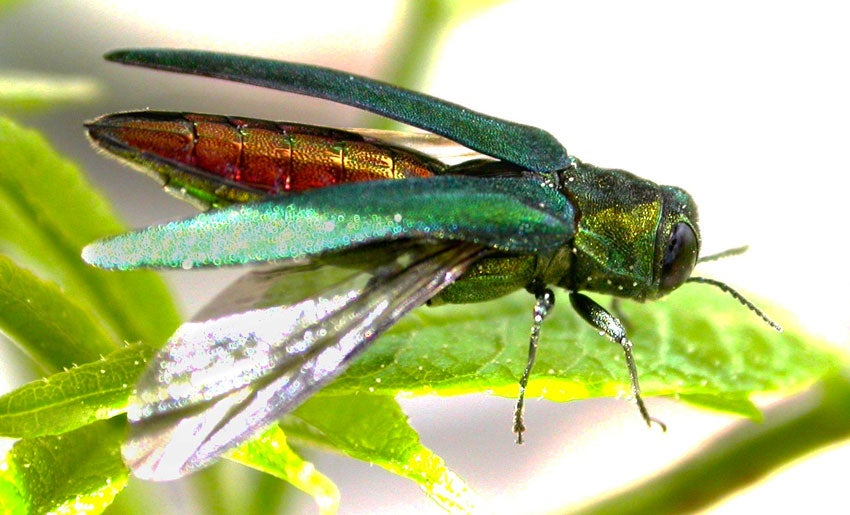Combatting the Infamous Emerald Ash Borer
Listen 00:52:57Are you worried about the emerald ash borer annihilating your arboretum? Mike McGrath, host of You Bet Your Garden, will examine your organic options for keeping this tree-killing pest at bay! Plus your fabulous phone calls.
Question of the Week:
“I recently started two dozen bonsai ash trees and am hoping you can offer some advice on overwintering them safely with the emerald ash borer so prevalent in our area. I plant all of my deciduous bonsai outside in their pots for the winter, but I’m concerned about keeping the ash trees safe from borer infestation. The trees are small enough that it would be easy to treat them, but is there anything organic that would selectively go after the borer? I’m guessing not, otherwise these trees wouldn’t be facing extinction in the wild.”
— Robert, who “Loves your show in Huntingdon Valley, PA”
Learn more about protecting trees from pests »
Highlights from show:
Crab Grass
Julie in New Jersey is frustrated with her lawn. It gets taken over every summer by tall spiky grass that is sharp edged. Julie had landscapers re-seed the whole lawn last fall then again in the Spring and it seems great and then mid summer hits and again the same grass is coming back. Mike says it sounds like crab grass or Japanese Stilt grass. Mike thinks the issue may be with the lawn cutting height and suggests that the first thing she does in the spring should be to sharpen the blades and raise deck up to 3 inches, which might make the difference and could end all her problems right there. Mike explains that the lawn doesn’t have the energy to fight back if it’s scalped. Mike also suggests getting a mulching mower so she can return the clippings to the lawn for a source of food. Julie says she waters once a week for about an hour and Mike reminds her that is the minimum amount of time and that it takes grass twenty minutes to accept water. Mike also suggests feeding the lawn in the spring with corn gluten meal just as the forsythia and red buds start to bloom. This will prevent any weed seeds from germinating and it will feed the lawn.
Gnat Attack
Aaron in Elkins Park, PA recently moved there from Philadelphia and has a couple of house plants with small insects in the dirt and on the outside of the plants. They look a little like fruit flies. Mike explains right away that they are fungus gnats. If Aaron were to look inside the soil he would see the wormy like larva living in the soil of the house plants. Fungus gnats require moist soil so if they appear it is usually a sign of over watering. However, there is a way to combat these gnats by applying BTI granules to the soil– a naturally occurring soil organism.
Outdoor Shower Mosquitoes
Rachel in Emerald Isle, NC has lived there for about year, a block from the ocean, and like most homes around there she has an outdoor shower to get the sand off. Annoyingly, every time Rachel takes a shower she is being assailed by mosquitoes. She was curious if the BTI was dangerous to other insects or animals in any way and if setting up traps was a good idea. Mike assures her that BTI only stops the breeding of biting flies in water (like mosquitoes) and does not harm any amphibians or fish or any other organism. First, absolutely create BTI traps with big buckets and donut shaped dunks. The other thing Mike recommends is creating a fan system so that air is moving across the shower.Mosquitoes are really weak fliers and they can’t fly in the slightest breeze. Mike also reminds Rachel that dragon flies are your best friend since they eat mosquitoes and she can put up homes for birds that like to eat mosquitoes as well.
WHYY is your source for fact-based, in-depth journalism and information. As a nonprofit organization, we rely on financial support from readers like you. Please give today.





